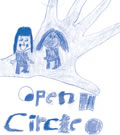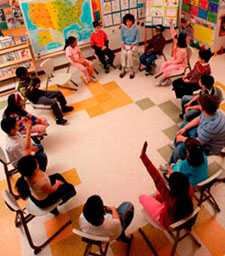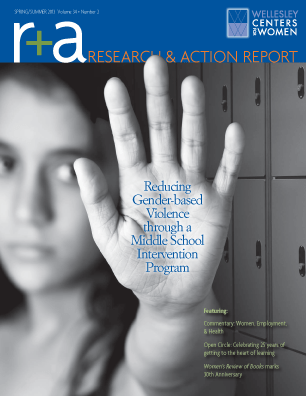Research & Action Report, Spring/Summer 2013
Open Circle, a program of the Wellesley Centers for Women (WCW), is celebrating its 25th Anniversary this year. A social and emotional learning (SEL) program for students in Kindergarten through Grade 5, Open Circle is dedicated to providing children with the skills they need to recognize and manage their emotions, establish positive relationships, make responsible decisions, develop care and concern for others, and handle challenging situations constructively.
Founded in 1987, Open Circle has grown significantly over the past quarter of a century. Started by Pamela Seigle, M.S., as a pilot program to improve the social skills of students in six Framingham, MA schools, the program expanded across New England within a few years. Open Circle became one of the first SEL programs to offer training to school and district administrators, special subject teachers, and support staff.
“As a new teacher, I recognized that what had been missing from my training was something beyond classroom management, and understanding the importance of relationships and learning relationships among students and teachers,” said Seigle, now executive director of Courage & Renewal Northeast. Through a colleague of hers, Siegle became aware of a social-problem-solving program at Yale, and decided to start an SEL program at the Stone Center at Wellesley College—one of WCW’s centers; the program eventually became known as Open Circle.
 To date, Open Circle has reached over two million students and 13,000 educators in over 300 schools in more than 100 urban, suburban, and rural communities across the United States, and it continues to grow. This past November, Partners HealthCare and its founding hospitals Brigham and Women’s and Massachusetts General Hospital, granted $1 million to the Boston Public Health Commission for a collaborative effort among the two organizations and the Boston Public Schools to help implement Open Circle in 23 of the city’s schools. Additionally, NoVo Foundation has committed to fund, through a $220,000 grant, a broad research study examining process outcomes and program impact for this initiative.
To date, Open Circle has reached over two million students and 13,000 educators in over 300 schools in more than 100 urban, suburban, and rural communities across the United States, and it continues to grow. This past November, Partners HealthCare and its founding hospitals Brigham and Women’s and Massachusetts General Hospital, granted $1 million to the Boston Public Health Commission for a collaborative effort among the two organizations and the Boston Public Schools to help implement Open Circle in 23 of the city’s schools. Additionally, NoVo Foundation has committed to fund, through a $220,000 grant, a broad research study examining process outcomes and program impact for this initiative.
“This expansion of Open Circle’s work in Boston Public Schools reflects the Wellesley Centers for Women mission of making the world a better place for women and girls, their families and communities, through research, theory, and action that increases justice and wellbeing,” noted Layli Maparyan, Ph.D., WCW executive director.
Open Circle consists of specialized curricula for each grade, with teachers and school staff participating in extensive training and coaching as they begin implementing the program in their schools.
“I believe SEL programs are essential for all schools, teachers, students, and parents,” said Marie Jutkiewicz, who has been a teacher since 1970, and an Open Circle trainer for more than ten years. “Just with the recent [Boston bombing] events, Open Circle is helping us to assess our students to see how affected they have been, and to better understand what they know and what they have experienced. Many people in my community have come to depend on Open Circle to discuss and read their children in such times of crisis.”
Research has shown that SEL can also help students make significant gains in academic achievement. According to a 2011 review of more than 200 studies published in the journal Child Development, students who participated in SEL gained, on average, 11 percentile points in reading and math.
“Success depends as much on students’ social and emotional development as on their cognitive abilities, and Open Circle can help improve these outcomes by providing teachers with evidence-based tools and techniques,” noted Nova Biro, M.B.A., Open Circle co-director.
 In classrooms that have adopted the Open Circle Curriculum, teachers hold 15- to 20-minute Open Circle Meetings twice a week throughout the school year, with students meeting in a circle of chairs with one empty seat, symbolizing there is always room for another person or voice in the circle. These meetings include a range of activities, such as group discussions, role-playing, storytelling, and community-building activities. The accessible lessons allow teachers and students to bring in their own voices to address conflicts or talk about difficult subjects such as peer exclusion, teasing, or bullying.
In classrooms that have adopted the Open Circle Curriculum, teachers hold 15- to 20-minute Open Circle Meetings twice a week throughout the school year, with students meeting in a circle of chairs with one empty seat, symbolizing there is always room for another person or voice in the circle. These meetings include a range of activities, such as group discussions, role-playing, storytelling, and community-building activities. The accessible lessons allow teachers and students to bring in their own voices to address conflicts or talk about difficult subjects such as peer exclusion, teasing, or bullying.
“My favorite activity is getting into the circle,” said Jutkiewicz. “I feel like it’s my warm, fuzzy check-in time with my children. We are calm and we talk and listen to each other. Calming down is so needed in today’s rushed, rushed, world.”
In addition to having a positive effect on the social and emotional wellbeing of students, the program provides benefits to teachers, too. In a 2011 survey of trained Open Circle teachers, 96 percent agreed that the training enhanced their teaching practice.
“Learning and teaching the Problem Solving Steps has been so beneficial,” said Nancy Purpura, a teacher for over 20 years and an Open Circle trainer since 2001. “I would never attempt to solve a problem until I was able to calm down, and while all of the steps are useful, this one really stands out for me,” she adds, noting that she appreciates the “sequential structure Open Circle provides for teachers.”
“I believe there is a tremendous effect on one’s teaching, students, parents, and my own life,” remarked Jutkiewicz. “I have done Open Circle for so long and believe in it so strongly that it is a little like breathing, and I forget about what I am doing that is Open Circle and what is really mine.”
Looking to the future and building on its recent expansion in Boston, Open Circle is planning for continued growth in Boston and other large school districts with support from a $250,000 growth and scaling grant from NoVo Foundation. Plans include development of an updated train-the-trainer program, leveraging technology to increase accessibility of training and coaching, further incorporating mindfulness practices for educators and students, and bringing Open Circle to pre-Kindergarten and Grades 6 through 8.
“We’ve heard from numerous educators in middle schools who are looking for proactive, comprehensive SEL programming for children beyond elementary school,” said Nancy MacKay, B.A., Open Circle co-director. “We want to investigate how we can help them establish classroom and school communities where young adolescents feel safe, connected, and ready to learn.”
Deborah Donahue-Keegan, Ed.D., Associate in Education at Wellesley College, interviewed high school students who participated in Open Circle while in elementary school. Students noted that many of the lessons they learned in the program have resonated throughout their day-to-day lives. Several students said they remembered learning to recognize Double D (dangerous and destructive) behaviors. Others commented that their life skills had improved from participating in the program.
“I think that I gained more people skills…the people that I did Open Circle with, I’m still friends with some of them…Open Circle is just sort of (a place) you talk about whatever you want, and I think that was really useful in maintaining and building relationships.”
“(I learned) to be more patient…we learned to settle down, listen to what others have to say…because they’re just like you—they have something to say, too.”
Keegan’s interviews also reveal that most students believe implementing Open Circle in Grade 6 would be beneficial, especially because that is such a transitional year for most students.
“Sixth grade is the big transition and stuff, so I feel like that’s one consistency from elementary to middle school…also there are so many changes with everything, so I think being able to talk about it is really good.”
“Kids really want to fit in, and there’s a lot of drama in middle schools with image, and friends, and everything is kind of stressful, and so I think it would be really good to have a consistent group.”
Whether they are a student or educator participating in Open Circle, each person leaves with new skills, new friends, and a healthy approach for tackling problems in relationships and difficult situations that arise in everyday life.
“My greatest hopes [for the program] were that students would live lives that have meaningful relationships and that they’d be able to engage in work, and be creative, and contribute to society,” said Seigle. “In an increasingly diverse society, it’s important to be able to communicate across differences.”
Open Circle is included on a variety of national lists for increasing students’ demonstration of pro-social skills, decreasing violence and other problem behaviors, and supporting an easier transition to middle school. The program is listed in the U.S. Department of Education’s Exemplary and Promising Safe, Disciplined, and Drug-Free Schools Programs Guidebook; the U.S. Substance Abuse and Mental Services Administration’s National Registry of Evidence-based Programs and Practices; and the Collaborative for Academic, Social and Emotional Learning’s 2013 CASEL Guide to Effective Social and Emotional Learning Programs.
“It is great to work with so many committed educators who are excited that Open Circle offers a proactive and systematic approach to social and emotional learning,” shared MacKay. “They tell us that that the program is helping them establish classroom and school communities where children feel safe, connected, and ready to learn—what more could we want?”
–Megan Kellett, B.A., Communications Associate, Wellesley Centers for Women


